Culling, Finning, Illegal Fishing...and Beaching!?
Is There Any Hope for the Great White Shark?
Guest Article by Clare James (14 October 2014) - Contact the author
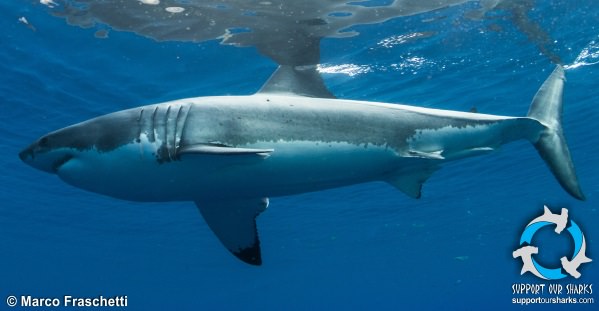 In recent years, the plight of Great White Sharks has hit the
headlines
around the world. In Australia, the mindless culling of Great Whites
has resulted in a global increase in media coverage on the
controversial issue of
shark control. However, there are many other
threats facing these beautiful creatures which need to be addressed,
such as the threat of illegal fishing.
In recent years, the plight of Great White Sharks has hit the
headlines
around the world. In Australia, the mindless culling of Great Whites
has resulted in a global increase in media coverage on the
controversial issue of
shark control. However, there are many other
threats facing these beautiful creatures which need to be addressed,
such as the threat of illegal fishing.
Illegal shark fishing was brought to my attention by an incident that
occurred in Mossel Bay earlier this year. Located on the Garden
Route of the
Western Cape of South Africa, Mossel Bay is home to a large
population of Great Whites. The Great White is a migratory species,
and this area is particularly important for them; research shows
that juveniles have extended residency periods of many months in Mossel
Bay. It is estimated that at any one time during
the year, 200-300 Great Whites may reside in the bay. Since 1991,
Great Whites have been
protected in South Africa,
but, unfortunately,
this does not stop people from trying to fish for these incredible
creatures.

In May 2014, a Great White was found washed up on Diaz
beach in Mossel Bay. A
beached shark is an unusual occurrence, as Great Whites are
negatively buoyant, which means that as soon as they die, they will
sink directly to the sea floor. The Great White’s death in Mossel
Bay, and why it ended up beached, opened up many questions for the
local shark researchers.
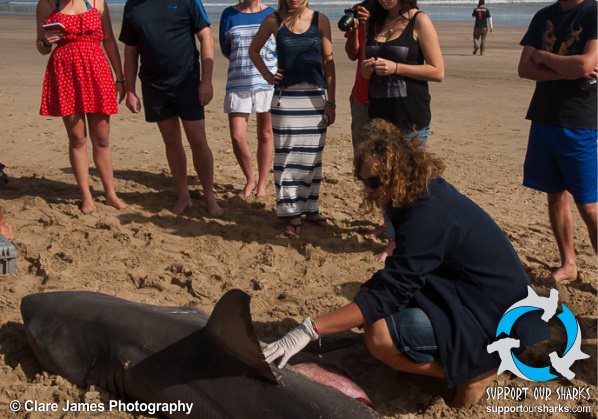
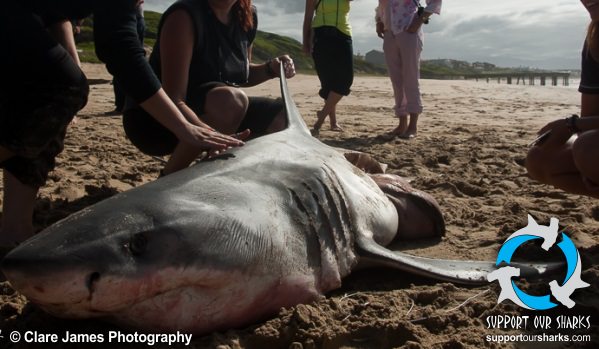
The researchers believed that the shark was the victim of
illegal fishing. This
was suggested due to the huge stainless-steel circle hook found in
its mouth, which was attached to an extremely thick trace line (made
of bicycle wire). If a fisherman is found using this sort of gear,
the Department of Environmental Affairs (DEA) has the right to
confiscate it. In this
particular case, barnacles were found growing on the hook,
which suggested that the shark may have broken free from the line,
leaving the hook and trace caught in its mouth and resulting in delayed
mortality.
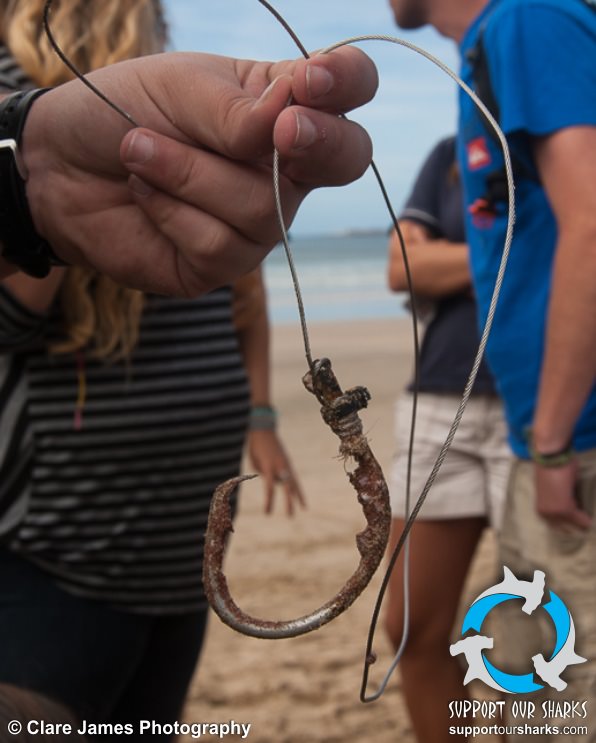
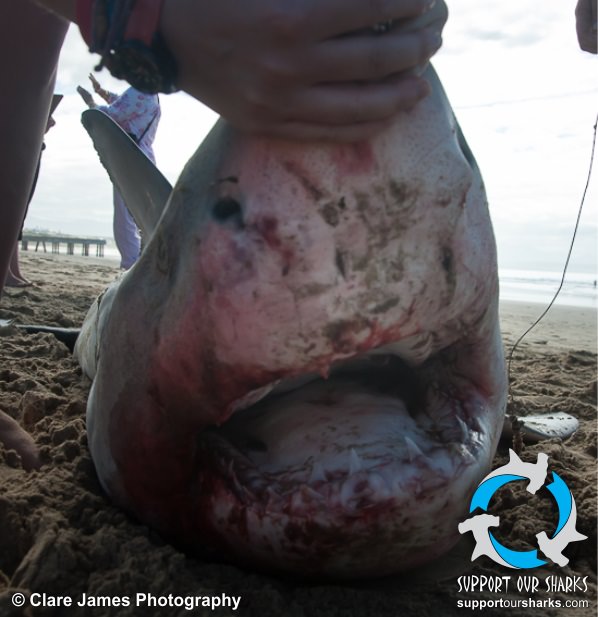
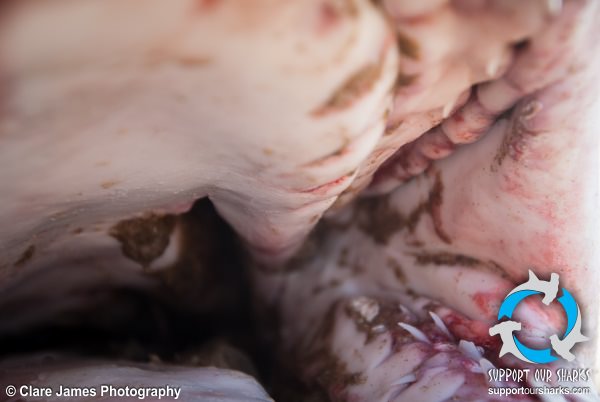
When a shark breaks free from a fishing line, the gear caught in its mouth
may increase the chance of it getting caught in nets and on boat
anchor lines. It is thought that the shark that beached in Mossel
Bay may have become caught on an anchor line and then sunk close to
the shore, which resulted in the incoming tide pushing it up onto
the beach. Unfortunately, no one witnessed this happening, so we can only
speculate on how and why this shark ended up in this situation.
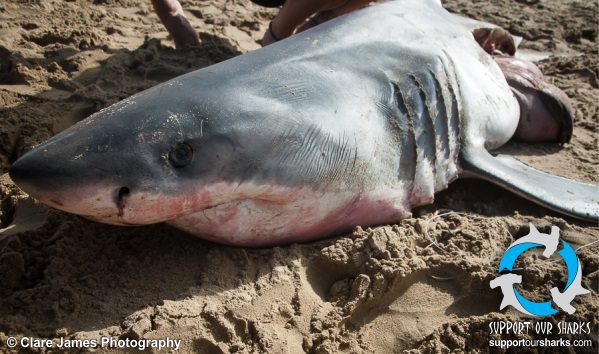
Another interesting aspect of this beaching was that a large section of the
shark's flank had been
removed by the time researchers arrived. This section was cleanly
cut away, which would suggest that
specialist knives were used. However, the fact that valuable parts
of the shark such as the fins and the jaw (worth around $10,000)
were not taken indicates that the removal was likely the work of an
opportunist.
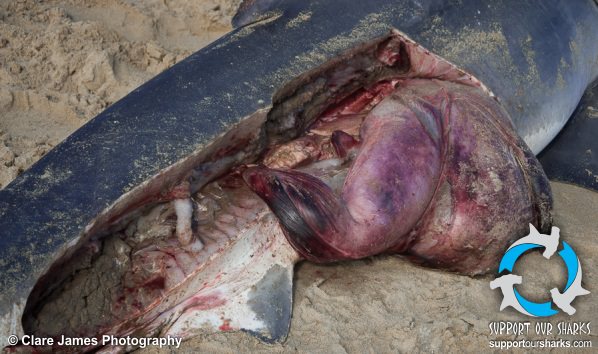
Become an active shark supporter today and help us to protect these amazing animals. Join us on Facebook for more information on how you can get involved.
For more information about the author of this article, go to Clare James Photography.
-----------------------------------------------
Please share your thoughts about this article below.
Other Interesting Articles:
Disclaimer
Support Our Sharks posts articles and material
prepared by other organisations and individuals not affiliated with
Support Our Sharks for educational purposes. Support Our Sharks does not
necessarily agree with the opinions expressed in such material. Support
Our Sharks also provides links from this site to the websites of
featured news articles above for informational purposes only. The links
do not imply an endorsement by Support Our Sharks of these articles or
the content of their respective web pages.
